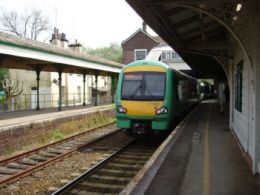Posted 30th July 2008 | 7 Comments
Authorities Clash Over Uckfield To Lewes Report

Southerns class 171 on the Uckfield line.
PUBLICATION of a report by Network Rail and consultant Mott MacDonald which claims no business case for restoration of the seven-and-a-half rail link between Uckfield and Lewes has resulted in a clash between East Sussex local authorities.
The GRIP 2 pre-feasibility study was commissioned by the Central Rail Corridor Board, whose members comprise local MPs and regional, county and district authorities representatives.
Network Rail’s report said that, while no physical obstructions preclude the £141 million rebuilding project, re-opening benefits needed to be double those forecast to make an economically viable case, a view shared by the Central Rail Corridor Board.
But other authorities, including Uckfield Town Council, have refuted this view and criticised the narrow scope of the study, and Lewes MP Norman Baker has said the battle to re-open the line will continue.
The missing link is regularly listed by rail analysts as one of the top five most advantageous re-opening schemes with potential to offer a new through route from south London to the South Coast.
Reader Comments:
Views expressed in submitted comments are that of the author, and not necessarily shared by Railnews.

Amir, EastBourne, United Kingdom
It does beggar belief but nothing will change until the government changes it policy and there is more chance of the moon breaking out of its orbit and crashing into the earth than this line getting built. If this government can spend £50 bill propping up Northern Rock which has just cost another £5bill then they could easily spend £140-150mil on this project.
Like you said people will still have to drive to the station so how is less petrol used. Traffic james might rise revenue in tax but surely traffic jams cost the country more in lost business and lateness. You cannot win, Britain needs to redically change this process. With roads maybe they should look at vehicle costs the cost to the environment and CO2 and put that down as a negative cost. Then road building would look a lot more expensive. Roads already cost nearly £1000 an inch so this already looks out of control! Hence the Hastings by-pass was never built. Soon we won't be building anything because the cost will be too high!
H. Harvey, Birmingham
When a rail scheme is considered the infrastructure costs and the vehicle costs are considered.
When roads are costed I believe there is no inclusion of vehicle costs
Apparently rail passengers time savings are also allocated a lower value than car occupants.
Even more sinister transfer of road to rail traffic is treated as a loss of tax revenue to the treasury.
Add to this the waty rail passenger growth forecasts mostly are mostly lower than outturn.
Factor in the fuel price forecast used in D(a)fT schemes with no allowance for CO2 costs its no wonder rail schemes do not occur in England
Terry, Bexhill
I wonder is the benefit of having a diversionary route available when engineering work is being undertaken around Haywards Heath was taken into account?
Or perhaps inflicting a slow, hot and stuffy bus on weekend passengers is regarded as fairly insignificant?
Mike, Crowborough, UK
Tunbridge Wells and Brighton are grid locked most of the time and parking is an expensive nightmare. The A26 is busier than ever. The A21 London - Hastings road duelling between North Farm and Tonbridge has been put back another two years. When are the planners / decision making politicians going to get their act together over this 7 mile stretch of line which should not have been closed in the first place ! This corner of England is a major tourist attraction and gateway to the UK, but has possibly the worst transport infrastructure imaginable. There is major commuter traffic between Brighton, Lewes, Uckfield, Crowborough, Tunbridge Wells, Tonbridge and beyond in both directions; but the hourly bus service only slogs along at about 35mph. The turbo diesel service from Uckfield to London Bridge via Oxted is excellent, but the flexibility offered by that extra seven miles and the reinstatement of the Eridge - Tunbridge Wells link would be an amazing improvement.
Network Rail - get your act together !
Dorian Angry, lowestoft
Again, nobody is formally questioning Newtork Rail's figures. This is the heart of the problem. £141 million? Who says so?
Brian Eastwood, Petersburg VA, USA
The so called "cost benefit "analysis used by the Departmentof Transport in collusion with HM Treasury is just one of the symptons of an ingrained culture within those departments that says that railways are bad and roads are good.
No wonder Britain is finished.
Mark, Eastbourne
The cost benefit analysis methodology used in this evaluation was biased against rail from the start. For example, if reopening had INCREASED local road traffic, the business case would have been BETTER!
The reason is that anything that results in less petrol/diesel being used is regarded as a 'cost' to the treasury (less tax revenue!) and so counts as 'bad' in this warped system.
In today's environmentally conscious times, that beggars belief.